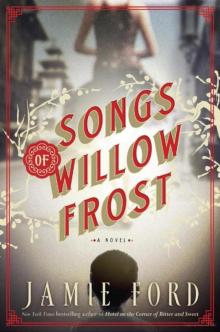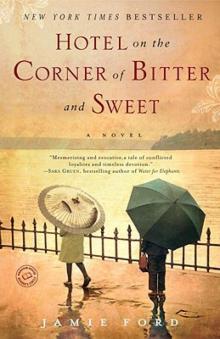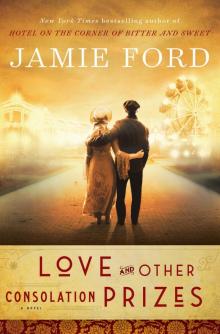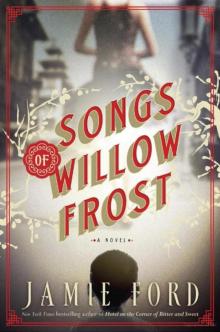- Home
- Jamie Ford
Love and Other Consolation Prizes Page 4
Love and Other Consolation Prizes Read online
Page 4
And sadly, so were the islands, when a constellation of sores had burst on the chest, arms, and legs of one of the other boys. Because of that illness, the ship was unable to make port in Honolulu. The boy, delirious with fever, had been taken to an isolation room and later his body was buried at sea, as the ship continued to the Northwest.
After that sad event, a rainbow appeared in the form of an oil-stained canvas curtain, which was hung from a rope that kept the nearby boys, Jun included, sequestered from the rest of the children in the steerage hold. The boys had been officially quarantined and were now fed from a separate serving kettle. The doctor paid special attention to them, often checking two or three times each day, though they were as healthy as ever. Or at least as loud as ever—they heckled the girls through the curtain. Especially Jun, who found perpetual amusement in singing vulgar songs, much to the disgust of everyone but the passing sailors. He also teased the girls behind the bars, loudly speculating about which one of them would be taken next. The girls shouted back with cutting words—the kinds of insults that could be hurled only from the safety of their cage.
Yung and the peasant girls stayed out of the fray, giggling until Jun focused his rage in their direction. He ranted until one of the passing sailors shouted in English and everyone laughed and giggled a bit more as they settled down for the night, feeling safe, knowing that despite his bark, Jun’s bite was trapped behind the curtain.
Yung fell asleep feeling sorry for the rest of the boys in quarantine.
—
AS YUNG SLEPT that night he dreamed about his mother. In his dream he’d come home early from his chores. Hungry and bored, he rummaged through the old opium tin that served as his mother’s memory box. Inside was a collection of dried flowers, feathers, shell buttons, and one of his teeth that had fallen out. She’d put it on the roof of their house for a month, an old superstition she believed might make his permanent tooth grow in faster. He was sniffing her empty perfume bottles when he heard his mother’s laughter downstairs and that of a strange man. Yung searched frantically for a place to hide as they stumbled into the tiny one-room apartment. In his dream Yung dashed beneath his mother’s bed, just in time, as two pairs of shoes entered the room, heavy leather boots and his mother’s faded yellow lotus slippers. Yung could smell a mixture of alcohol, tobacco, and sweat. He remained motionless. Silent as clothing fell to the floor, his mother’s old mandarin dress and the man’s starched white collar. Ernest heard the dance of metal as her hairpin fell in front of him. He reached out and grabbed it while the steel springs above him bent as the couple fumbled about the bed. Yung heard muffled sounds that seemed like crying amid the heavy, pained breathing. He gripped the hairpin and imagined shoving the long, sharp needle up into the mattress.
In the darkened hold, Yung opened his eyes, smelled the musty woolen blanket, and heard the thrum of the ship’s steam engine. He felt the gentle rocking.
It was only a dream. My mother is gone.
Then Yung heard a timid cry and felt movement next to him. He rolled over and rubbed his eyes, thinking that perhaps he was still dreaming as he saw that Jun had climbed on top of the girl next to him. She was struggling, whimpering, and his hand covered her mouth, while his other hand fumbled with the buttons on her shirt. His large frame draped over her like a blanket, pressing her tiny body into the straw mattress.
Yung’s eyes met the larger boy’s gaze in the dim lamplight. “Look away, baby brother,” the boy hissed.
Yung closed his eyes, then opened them. It wasn’t a nightmare; it was real.
“And if you tell, I’ll do this to the rest of your big sisters. Then I’ll do it to you.”
Yung’s heart raced. He was confused, terrified as he slowly turned away. Jun was three times his age and five times his size. But Yung’s hand moved as though it had a mind of its own as he reached beneath his pillow and pulled out the long brass hairpin. He felt tightness in his chest and a sick sensation of dread in his stomach as he heard the girl struggle, but he was paralyzed with fear. Then Yung saw that the Japanese girl next to him was stirring in the gloaming. He watched her eyes widen, then she snatched the hairpin from his hand and scrambled over him, her bluish robe a blur, flowing water. She raised her arm as though reaching for the ceiling, then she brought it down like a hammer and drove the long copper needle into the flesh of the boy’s posterior. It made a sound that could have come from a butcher shop, the slap of a fist on a haunch of meat. The boy screamed. Yung watched as Jun stumbled out of bed, landed hard on the floor, where he curled and writhed in pain, cursing and shouting, crying as tears streamed down his face, “Lou geoi! Dirty lou geoi!” He continued shouting that she was lower than an alley whore who sold her body for scraps of food.
And as the boy rolled to his knees, Yung watched his mother’s keepsake swing about, stuck like a dragonfly on flypaper. He reached for the hairpin, pulling it free as Jun limped about the room clutching the back of his pants.
“I’m not lou geoi!” the Japanese girl shouted, spittle flying from her mouth. She was being restrained by the girls who had now woken in equal proportions of confusion, shock, and amusement. Others tended to the girl Jun had attacked.
“I’m Fahn!” the Japanese girl yelled, despite being half as tall—a menacing, ferocious eight-year-old screaming in the face of the teenage boy. She shouted again and gritted her teeth as Jun retreated behind the curtain and sailors burst into the room. Then she pointed at her chest. “I’m Fahn.”
Yung didn’t know if that was a nickname. It was a strange word, in a strange dialect. To him the words meant: I’m girl.
As the others let her go, she sat next to Yung and caught her breath. Her eyes welling with emotion, she smiled at him and said, “Are you still going to marry me?”
EVERYONE PLAYS, NOBODY WINS
(1962)
The morning after Juju had visited, Ernest found himself dwelling on memories of that night in the cargo hold. He remembered how a few days later the ship finally reached Victoria, British Columbia, where the boys and girls were separated with little fanfare or explanation. I lost my baby sister after two days, Ernest thought. Then I lost my new big sisters in less than four weeks. I didn’t even get to tell them goodbye.
Beneath a sliver of a moon he’d been transferred with the other boys to a small sloop, presumably bound for Port Townsend, Washington—a gateway to the salmon canneries and sawmills. Or perhaps the oyster fields. The boys watched as the dark city slid by in the night a few hundred yards away. But they had only a glimpse before they were tied into burlap bags and laid on the deck. The sailors had told them the subterfuge was for the boys’ own good, in case the Coast Guard stopped the boat and customs officials wanted to inspect the cargo. They’d been told to lie perfectly still, silent, and not to worry. But on that first night, amid a flurry of ships’ horns, yelling, and what sounded like firecrackers, Ernest remembered clutching his mother’s hairpin.
In his mind’s eye the smugglers were the infamous Ben Ure and Lawrence “Pirate” Kelly, men known for bringing illegal Chinese workers into Washington via Deception Pass. But now, as a grown man, Ernest knew he’d probably been projecting. Maybe that was something he’d read in a history book—something to explain away the horrible, helpless feeling of being hoisted up and tossed overboard, falling through the air, crashing into the frigid water and tasting the salt. He heard cries for help and then the muffled gurgles of the other boys as they sank. Somehow he’d managed to use that hairpin to rip a hole large enough to fit his fingers through, then his hands, large enough to tear his way free. The other boys had drowned by the time Ernest reached the surface, their shrouded bodies bumping him gently in the darkness, bobbing on the incoming tide like driftwood.
Ernest closed his eyes and remembered lights flickering on the horizon, rising and falling beneath the waves as he dog-paddled to the nearest shore, shivering, his lips and fingers numb. The black water was so cold his skin tingled and then burned.
The policeman’s name was Ernest, and so Yung had been given his rescuer’s name, though he never saw the man again. But he never forgot his words: “You’re a lucky kid. In my twenty years on the job, Dead Man’s Bay has always lived up to its title.”
—
ERNEST SHOOK HIMSELF out of his daydreams and checked his watch. He grabbed his coat and hat, and went to meet his friend Pascual at Osami’s Barbershop.
They both lived at the Publix now, Ernest’s three years to Pascual’s thirty. With his friend’s fluctuating nighttime schedule, weeks could go by without them running into one another, so they’d adopted a routine of meeting every week for a shave and a haircut and then a late breakfast at the Linyen, Don Ting, or the Little Three Grand Café. His friend was an ardent fan of the many comic books and pulp magazines Osami always had on hand amid the local Asian papers. Pascual called the barbershop his reading room, so Ernest wasn’t surprised to walk in and find him already engrossed in an issue of My Greatest Adventure. The cover story was titled “I Was Marooned on Earth!”
That’s how Ernest felt.
“Kuya Ernest, I almost didn’t think you’d show up. What happened, you been avoiding me or something?” his friend asked as he reclined in a red leather chair while the barber slathered menthol-scented shaving cream on Pascual’s dark, windburned cheeks and his salt-and-pepper sideburns. “I went to the Black and Tan last night. That widow, Dolores, was asking about you. Maybe it’s time the Lone Ranger got back in the saddle. I know that, technically, you’re still married and all, and I know you’ve done so much for Gracie these past few years. I’m just thinking, maybe it’s time. Maybe she would want you to be happy or something.”
Ernest shook his head and smiled at the comforting sound of his friend’s Filipino accent, the way the word thing came out ting. Ernest grabbed a refolded newspaper from a wooden rack and sat in the adjacent chair as the barber’s wife rolled down his shirt collar and wrapped a seersucker cape over his shoulders. She pinned the fabric around his neck with a silver clip as he opened the paper. The coupons had already been cut out.
“The usual, Mr. Ernest?” she asked.
Ernest nodded and spoke to Pascual, whom he could see in the mirror, both of their images reflected back and forth, shrinking toward infinity. “I’ve been busy. Besides, which one is Dolores?”
His friend paused as Osami drew a straight razor across Pascual’s left cheek and then wiped the excess shaving cream on a towel draped over his arm. “So many older, single ladies who remember you from when you used to come with Gracie. I talk to them, but they always just want to know about you. And that’s your cruel magic, my handsome friend—you do better than me, even when you’re not in the building.”
As the barber’s wife put a cloth on Ernest’s shoulder and wrapped a steaming towel around his face, Pascual spoke in a more serious tone. “You know, someone else passed by the club last night. Your daughter Juju—she went around, asked everyone willing to talk, and her questions were all about you, my mysterious kaibigan.”
Ernest felt his stomach tighten, and the towel felt suffocating.
“But no worries, no one said too much, mainly because nobody there knows anything. But you know your bata, she can be pretty insistent. She kept asking people about your childhood, about the neighborhood you grew up in, where you went to school, if you were adopted or anything, if you ever went by another name. Half the bar knows her from the newspaper or as your daughter, so they just played along, but I think she scared the other half. They probably pegged you for some kind of red spy or something. Which only made you more intriguing to Dolores.” Pascual shook his head. “Magic, my friend.”
Magic, Ernest thought. That was how Pascual somehow made a living as a full-time gambler and part-time nine-ball hustler at the Palace, a local disturbance in the shape of a pool hall. Pascual had once been a member of the International Longshoremen and Warehousemen’s Union, until the national branch called them Communists and tossed everyone out. He couldn’t fight the accusations because Filipino workers were being deported for associating with improper organizations. That’s how they’d met, more than thirty years ago, both as newly naturalized citizens.
“You didn’t tell Juju—” Ernest asked.
Pascual cut him off. “Nah, I didn’t say much. Not that I can remember anyway.” Then he shrugged. “Aw, I might have said a few things, but then to make sure I didn’t spill the beans, I switched to Tagalog, started talking like I just stepped off the boat from Luzon, which isn’t too hard after a few whiskey sours. Juju just laughed and went around, kept asking folks, but—you know, she hit the No-No Boys pretty hard back when she was a cub reporter, tore up the whole neighborhood, so even those who know her aren’t inclined to say too much. And me, I wouldn’t give you up for a million dollars, on my mother’s grave.” Pascual crossed himself, then blew a kiss toward the old tin ceiling, painted white. “Rest in peace, Mama. Diyos pagpalain.”
“God bless us all,” the barber’s wife said as she removed the towel from Ernest’s face and began applying shaving cream to his cheeks with a small boar-bristle brush. Ernest opened the newspaper and flipped through the local news pages, searching until he found her byline: Judy Young. And her piercing photo next to a neighborhood feature titled “WE MUST SAVE PIKE PLACE MARKET,” SAYS WING LUKE, SEATTLE’S FIRST ORIENTAL CITY COUNCILMAN. The headline seemed fairly benign, but the article about rescuing the market, which had fallen into disrepair after all the Japanese farmers and their families were taken away, didn’t pull any punches. The old internment camps were a taboo subject, but Juju had no problem addressing that particular elephant in the room.
Ernest remembered when his daughter had graduated from the University of Washington with a degree in journalism. He’d joked and called her Lois Lane.
She’d said, “I’d rather you call me Nellie Bly.”
Ernest heard a door chime and lowered the paper as a pair of Chinese boys, probably still in grade school, came into the barbershop with stubby pencils tucked behind their ears. One of them held up a pad of paper that had been printed with grids for Saturday’s lottery numbers and stamped by the Sun May Store around the corner.
Ernest said, “No thanks. I don’t play,” while he watched Pascual fill out ten sheets as though each set of numbers was part of a complex math equation, a riddle that could be solved with sound reasoning, cunning, and a pinch of guile. Then he handed the boys a sawbuck from his money clip and flipped them a silver dollar to split between them for running his lottery picks back to the mercantile.
“Hey, Donnie, if I win that ten thousand dollars,” Pascual shouted as they scurried to the shop next door, “I’ll give you each five—no, ten percent, eh!”
Ernest noticed Osami and his wife glancing at one another, eyebrows raised. Then they shook their heads in tandem and continued shaving. He listened as the barber’s wife spoke to her husband in Japanese, and then chuckled. She switched back to English and patted Pascual on the shoulder. “People been playing that lottery ever since I was born.” She extended the word born into two even syllables. “Nobody ever win that big prize money—nobody. And I guarantee, if someone ever does, you can bet it’ll be a Sun May cousin.”
Ernest smiled and stared out the window at Chinatown, a neighborhood not without crime or scandal, but no more or less than the Central District, or Fremont, Rainier Beach, or downtown Seattle for that matter. Now Juju was canvassing the neighborhood.
She’s tenacious, Ernest thought, just like her mother. Juju was placing small bets all over town, like Pascual playing the lottery, hoping to eventually cash in.
RISING FROM GRACE
(1
962)
An hour later Ernest regarded a plastic angel that dangled from the rearview mirror of Juju’s red Volkswagen Beetle. As she drove them from Chinatown to her home on the south side of Seattle’s Queen Anne Hill, the ornament swayed back and forth and its golden thread entangled the figure’s halo, leaving the heavenly messenger looking as though it had been lynched.
“Since when did you become the outwardly religious type?” Ernest asked.
“It was a gift,” Juju said. “From one of Mom’s old friends from church. You know how they are, everyone’s my auntie and all of them are hoping I settle down, find a nice man to take care of me, maybe a doctor or a lawyer—or maybe just their acne-scarred nephew. They want me to have kids, go to PTA meetings, and host cakewalks. Those ladies are always seeking to save my soul, one religious trinket at a time.”
“Amen.” Ernest nodded, remembering the last time he’d heard the bells at the Baptist church on King Street. He hadn’t been there in years, mainly because that was always Gracie’s church, while Ernest considered himself a deist, agnostic, Shinto Jesuit—a mishmash, a spiritual refugee who had fled an oppressive regime as a child and could never assimilate anywhere else. Though the ladies at church were nice, and he did miss playing bingo, pinochle, and mah-jongg on Tuesday and Thursday nights.
“Now that I’ve agreed to pick you up,” Juju said, lighting a cigarette and changing the subject, “you’re going to give me the whole story about your childhood, yes?”
Ernest cracked the window and watched her menthol smoke swirl away. He noticed burn marks on the dashboard where Juju’s cigarettes had melted the plastic. “I swear to tell the truth,” he said. “The whole truth and nothing but the truth…”

 Songs of Willow Frost
Songs of Willow Frost Hotel on the Corner of Bitter and Sweet
Hotel on the Corner of Bitter and Sweet Love and Other Consolation Prizes
Love and Other Consolation Prizes Songs of Willow Frost: A Novel
Songs of Willow Frost: A Novel